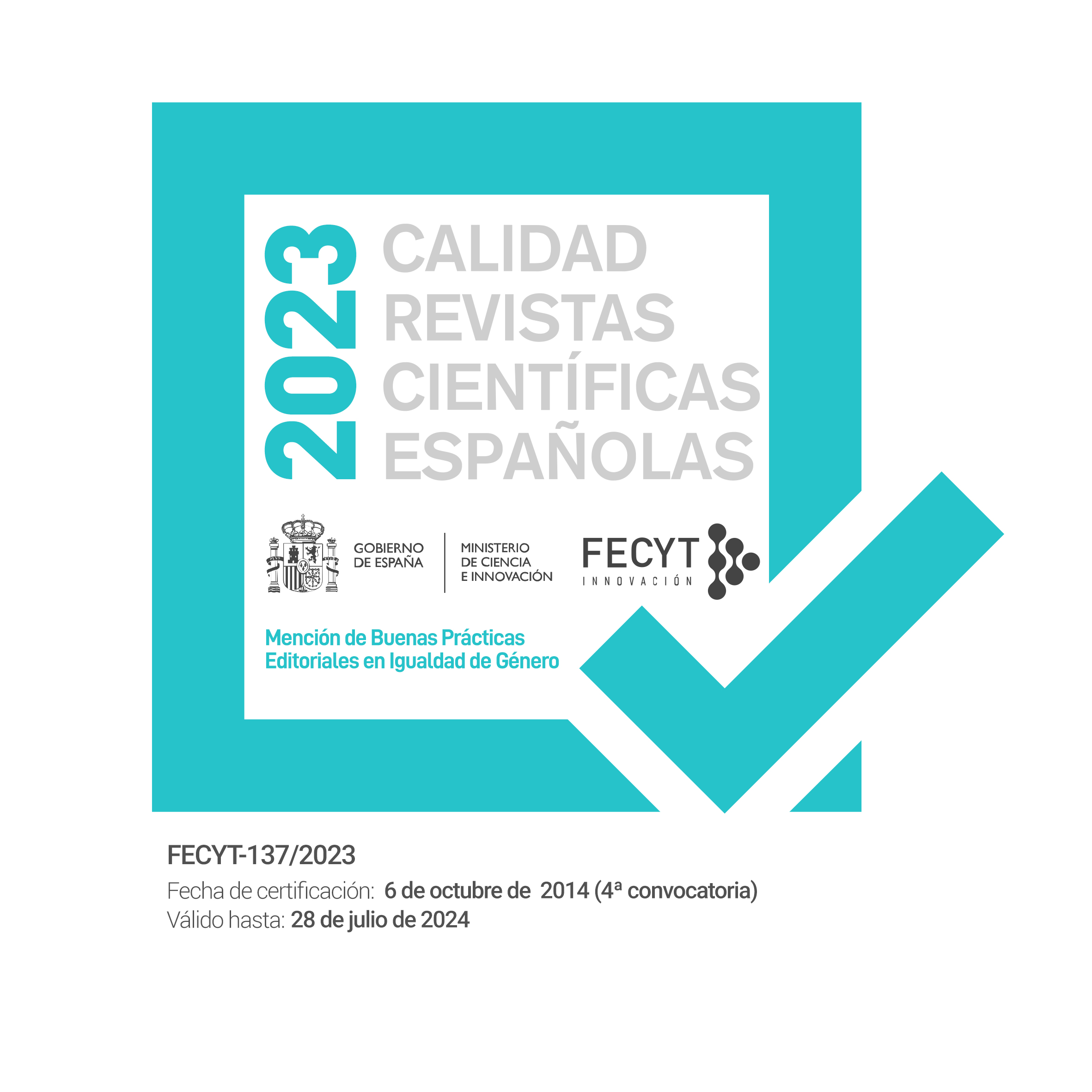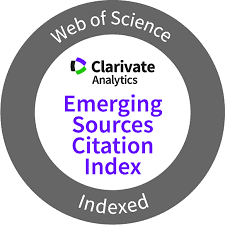La crisis de la Covid-19 como oportunidad política. El uso de Twitter por Santiago Abascal durante el estado de alarma en España (14 de marzo-20 de junio de 2020)
DOI:
https://doi.org/10.31921/doxacom.n33a993Palabras clave:
Vox, coronavirus, covid-19, Twitter, Santiago AbascalResumen
Los grupos políticos de extrema derecha se caracterizan por tratar de aprovechar los momentos de crisis para hacer llegar sus mensajes a la sociedad. Este tipo de partidos utiliza las redes sociales como altavoces de sus propuestas y lugar donde reclutar simpatizantes, evitando a los medios de comunicación tradicionales. En España el primer estado de alarma (entre 14 de marzo y 20 de junio de 2020), provocado por la covid-19, supuso una oportunidad para que Vox y Santiago Abascal multiplicaran sus críticas al gobierno y se presentaran como alternativa política. A través de una metodología cuantitativa y cualitativa, la presente investigación evalúa la forma en la que la actividad en Twitter del perfil oficial de Santiago Abascal ha logrado hacer llegar su mensaje y conseguir más adeptos. Para ello se ha analizado el efecto producido por los mensajes publicados en el perfil de Santiago Abascal durante el estado de alarma en España, comparándolo con el del resto de líderes políticos españoles. Los resultados muestran que los seguidores de Santiago Abascal son los que se manifiestan más activos a la hora de interactuar con los mensajes publicados en su perfil, de un modo muy superior al del resto de líderes políticos.
Descargas
Citas
Aba, A. (2011). El estado de alarma en España. Teoría y Realidad Constitucional, 28. 305-334. DOI: 10.5944/trc.28.2011.6961
Acha-Ugarte, B. (2018). The Far Right in Western Europe: “From the Margins to the Mainstream” And Back?. Cuadernos Europeos de Deusto, 59. 75-97. DOI: 10.18543/ced-59-2018pp75-97
Agnew, J. (2020). American “Populism” and the Spatial Contradictions of US Government in the Time of COVID-19. Geopolítica(s). Revistas de estudios sobre espacio y poder, 11 (número especial). 15-23. DOI: 10.5209/geop.69018
Ahmed, R. y Pisoiu, D. (2020). Uniting the far right: how the far-right extremist,New Right, and populist frames overlap on Twitter–a German case study. European Societies. October 2020. DOI: 10.1080/14616696.2020.1818112
Åkerlund, M. (2020). The importance of influential users in (re)producing Swedish far-right discourse on Twitter. European Journal of Communication, 35(6), 613-628. DOI: 10.1177/0267323120940909
Akkerman, T.; De-Lange, S. L. y Rooduijn, M. (2016). “Into the mainstream? A comparative analysis of the programmatic profiles of radical right-wing populist parties in Western Europe over time”. En: Akkerman, T.; De-Lange, S.; Rooduijn, M. Radical right-wing populist parties in Europe. Into the mainstream?. 53-69. New York: Routledge
Antón-Mellón, J. y Hernández-Carr, A. (2016). El crecimiento electoral de la derecha radical populista en Europa: parámetros ideológicos y motivaciones sociales. Política y Sociedad, 53(1). 17-28. DOI: 10.5209/rev_POSO.2016.v53.n1.48456
Arroyo, J. (2020). Coronavirus: la OMS declara la pandemia a nivel mundial por Covid-19. Redacción médica, 11 de marzo. Disponible en: http://bit.ly/2OuGbnq
Bastos, M. T. y Mercea, D. (2019). The Brexit Botnet and User-Generated Hyperpartisan News. Social Science Computer Review, 37(1). 38-54. DOI: 10.1177/0894439317734157
Bennett, S. (2019). “Standing up for 'real people' UKIP, the Brexit, and discursive strategies on Twitter”. En: Zienkowski, J. y
Breeze, R. Imaging the peoples of Europe. Populist discourses across the political spectrum. 229-256. Amsterdam: John
Benjamins. DOI: 10.1075/dapsac.83.10ben
Berman, R. y Katona, Z. (2019). Curation Algorithms and Filter Bubbles in Social Networks. Marketing Science, 39. 296-316. DOI: 10.1287/mksc.2019.1208
Berti, C. (2020). Right-wing populism and the criminalization of sea-rescue NGOs: the 'Sea-Watch 3' case in Italy, and Matteo Salvini's communication on Facebook. Media Culture & Society. September 2020. 0163443720957564. DOI: 10.1177/0163443720957564
Bialasiewicz, L. y Stallone, S. (2020). Focalizing new-Fascism: Right politics and integralisms in contemporary Italy. Environment and Planning C-Politics and Space, 38(3). 423-442. DOI: 10.1177/2399654419871303
Boulianne, S.; Koc-Michalska, K. y Bimber, B. (2020). Right-wing populism, social media and echo chambers in Western democracies. New media & Society, 22(4). 683-699. DOI: 107.171/1774/61144614448418918989933983
Caiani, M. (2019). The rise and endurance of radical right movements. Current sociology, 67(6). 918-935. DOI: 10.1177/0011392119868000
Campos-Domínguez, E. (2017). Twitter y la comunicación política. El profesional de la información, 26(5). 785-793. DOI: 10.3145/epi.2017.sep.01
Cheung-Blunden, V. (2020). Situational insecurity versus entrenched ideologies as the source of right-wing voters’ anti-migrant sentiment on both sides of the Atlantic. Journal of Applied Social Psichology, marzo. DOI: 10.1111/jasp.12663
Conde, M. (2020). Brazil in the Time of Coronavirus. Geopolítica(s). Revistas de estudios sobre espacio y poder, 11 (especial). 239-249. DOI: 10.5209/geop.69349
Cooper, S. (2006). Test Case: A Preview of Disruption. Harvard Business Review. Disponible en http://bit.ly/3r8BAVN
Costa-Sánchez, C. y López-García, X. (2020). Comunicación y crisis del coronavirus en España. Primeras lecciones. El profesional de la información, 29(3). DOI: 10.3145/epi.2020.may.04
Cruz, M. (2020). Pablo Iglesias acusa a Vox de “querer dar un golpe de Estado” pero “no atreverse”. El Mundo, 28 de mayo. Disponible en https://bit.ly/394CfkH
Darius, P. y Stephany, F. (2019). "Hashjacking" the Debate: Polarisation Strategies of Germany's Political Far-Right on Twitter. Social Informatics, Socioinfo 2019, 11864. 298-308. DOI: 10.1007/978-3-030-34971-4_21
Eatwell, R. (2007). Hacia un nuevo modelo de liderazgo carismático de derecha. En: Simón, M. Á. La extrema derecha en Europa desde 1945 a nuestros días. 19-38. Madrid: Tecnos
Edo, A.; Giesing, Y.; Öztunc, J. y Poutvaara, P. (2019). Immigration and electoral support for the far-left and the far-right. European Economic Review, 115. 99-143. DOI: 10.1016/j.euroecorev.2019.03.001
EFE (2020). Vox acusa a Sánchez de presidir un Gobierno “ilegítimo” basado en la mentira. La Vanguardia, 7 de enero. Disponible en http://bit.ly/2PeTJng
EFE (2020b). Twitter suspende la cuenta de Vox por incitación al odio. 20 minutos, 22 de enero. Disponible en http://bit.ly/3r7ZMrc
Enli, G. (2017). Twitter as arena for the authentic outsider: exploring the social media campaigns of Trump and Clinton in the 2016 US presidential election. European Journal of Communication, 32(1). 50-61. DOI: 10.1177/0267323116682802
Europa Press (2019). Abascal defiende el veto a medios de comunicación y los acusa de una “demonización” de Vox que puede generar violencia. Europa Press, 7 de noviembre. Disponible en http://bit.ly/2NG5AdS
Europa Press (2020). Vox: “Todos los enemigos de España van a formar parte de este gobierno”. Europa Press, 7 de enero. Disponible en http://bit.ly/3rbYP10
Eurostat (2020). Individuals using the internet for participating in social networks. Disponible en http://bit.ly/2Pfv1n2
Evolvi, G. (2019). Emotional Politics, Islamophobic Tweets. The Hashtags #Brexit and #chiudiamoiporti. Partecipazione e Conflitto, 12(3). 871-897. DOI: 10.1285/i20356609v12i3p871
Ferreira, C. (2019). Vox como representante de la derecha radical en España: un estudio sobre su ideología. Revista Española de Ciencia Política, 51, 73-98. DOI: 10.21308/recp.51.03
Francia, P. L. (2017). Free Media and Twitter in the 2016 Presidential Election: The Unconventional Campaign of Donald Trump. Social Science Computer Review, 36(4). 440-455. DOI: 10.1177/0894439317730302
Froio, C. & Ganesh, B. (2019). The transnationalisation of far right discourse on Twitter. European Societies, 21(4). 513-539. DOI: 10.1080/14616696.2018.1494295
Frommer, F. (2011). El pensamiento PowerPoint. Barcelona: Ediciones Península
Gallego, F. (2017). El Frente Nacional francés. De la reagrupación de la extrema derecha a la alternativa nacional-populista (1972-2014). Tiempo devorado. Revista de Historia Actual, 4(1). 5-38. Disponible en http://bit.ly/2OS2RhS
Gould, R. (2019). Vox España and Alternative für Deutschland: Propagating the Crisis of National Identity. Genealogy 3(4). 64. DOI: 10.3390/genealogy3040064
Groshek, J. y Koc-Michalska, K. (2017). Helping populism win? Social media use, filterbubbles, and support for populist presidential candidates in the 2016 US election campaign. Information, Communication & Society, 20(9). 1389-1407. DOI: 10.1080/1369118X.2017.1329334
Gruchola, M. y Sławek-Czochra, M. (2021). “The culture of fear” of inhabitants of EU countries in their reaction to the COVID-19 pandemic – A study based on the reports of the Eurobarometer. Safety Science, 135. 105140. DOI: 10.1016/j.ssci.2020.105140
Hansen, M. A. y Clemens, Jennifer L. (2019). What to expect when you’re electing: the relationship between far-right strength and citizenship policy in Europe. Comparative European Politics, 17(5). 673-695. DOI: 10.1057/s41295-018-0120-7
Howard, P. N.; Woolley, S. y Calo, R. (2018). Algorithms, bots, and political communication in the US 2016 election: The challenge of automated political communication for election law and administration. Journal of Information Technology & Politics, 15(2). 81-93. DOI: 10.1080/19331681.2018.1448735
Hutchins, R. D. y Halikiopoulou, D. (2019). Enemies of liberty? Nationalism, immigration, andthe framing of terrorism in the agenda of the Front National. Nations and Nationalism, 26(1). 67-84. DOI: 10.1111/nana.12555
IMF (2020). World Economic Outlook, April 2020: The Great Lockdown. Disponible en http://bit.ly/3r28V4w
Johns Hopkins (2021). Coronavirus Resource Center. Disponible en: http://bit.ly/3qpcdi6
Junta de Andalucía (2018). Elecciones Parlamento de Andalucía 2018. Resultados definitivos. Disponible en http://bit.ly/3r290VS
Keddell, E. y Beddoe, L. (2020). The tyranny of distance: The social effects and practice adaptations resulting from Covid-19 lockdown rules. Aotearoa New Zealand Social Work, 32(2). 41-45. DOI: 10.11157/anzswj-vol32iss2id741
Kissas, A. (2019). Performative and ideological populism: The case of charismatic leaders on Twitter. Discourse & Society, 31(3). 268-284. DOI: 10.1177/0957926519889127
Kuman, V.; Doshi, K. U.; Khan, W. H. y Rathore, A. S. (2020). COVID-19 pandemic: mechanism, diagnosis, and treatment. Journal of Chemical Technology and Biotechnology, 96(2). 299-308. DOI: 10.1002/jctb.6641
La Razón (2019). Vox no se reunirá con Sánchez mientras negocie con “los enemigos de España”. La Razón, 12 de diciembre. Disponible en http://bit.ly/2QjrGUk
Latif, A. A. y Mukaratirwa, S. (2020). Zoonotic origins and animal hosts of coronaviruses causing human disease pandemics: A review. Onderstepoort Journal of Veterinary Research, 87(1). a1895. DOI: 10.4102/ojvr.v87i1.1895
Lázaro, F. (2014). Vidal-Quadras y Abascal toman las riendas de Vox apostando por la “regeneración” y la unidad de España. El Mundo, 8 de marzo. Disponible en https://bit.ly/3rctqeJ
Marcos, J. (2020). El PSOE denuncia ante la Fiscalía a Vox por difundir bulos. El País, 16 de abril. Disponible en http://bit.ly/38Y4ce3
Matakos, A.; Tu, S. y Gionis, A. (2020). Tell me something my friends do not know: diversity maximization in social networks. Knowledge and Information Systems, 62. 3697–3726. DOI: 10.1007/s10115-020-01456-1
Michailidou, A. (2017). “Twitter, Public Engagement and the Eurocrisis: More than an Echo Chamber?” En: Barisione, M. y Michailidou, A. Social Media and European Politics. 241-266. London: Palgrave Macmillan. DOI: 10.1057/978-1-137-59890-5_11
Ministerior del Interior (2020). Consulta de Resultados electorales. Disponible en http://bit.ly/3s7vgiA
Mondon, A. y Winter, A. (2019). Whiteness, populism and the racialisation of the working class in the United Kingdom and the United States. Identities. Global studies in Culture and Power, 26(5). 510-528. DOI: 10.1080/1070289X.2018.1552440
Moreno, J. (2020). The Iron Triangle of Urban Entrepreneurialism: The Political Economy of Urban Corruption in Spain. Antipode, 52(5). 1351-1372. DOI: 10.1111/anti.12637
Nayak, J.; Mishra, M.; Naik, B.; Swapnarekha, H.; Cengiz, K. y Shanmuganathan, V. (2021). An impact study of COVID-19 on six different industries: Automobile, energy and power, agriculture, education, travel and tourism and consumer electronics. Expert Systems. 1-32. DOI: 10.1111/exsy.12677
Norris, P. (2002). Democratic Phoenix. Reinventing Political Activism. Cambridge: Cambridge University Press
Olesky, T.; Wnuk A.; Maison, D. y Lys, A. (2021). Content matters. Different predictors and social consequences of general and government-related conspiracy theories on COVID-19. Personality and Individual Differences, 168. 110289. DOI: 10.1016/j.paid.2020.110289
Ortega Dolz, P. y González, M. (2020). Tormenta política tras declarar un general que la Guardia Civil trabaja para minimizar bulos contrarios al Gobierno. El País, 20 de abril. Disponible en http://bit.ly/314v0Fe
Ott, B. L. (2017). The age of Twitter: Donald J. Trump and the politics of debasement. Critical Studies in Media Communication, 34(1). 59-68. DOI: 10.1080/15295036.2016.1266686
Padovani, C. (2018). Lega Nord and Anti-Immigration ism: The Importance of Hegemony Critique for Social Media Analysis and Protest. International Journal of Communication, 12. 3553-3579. Disponible en http://bit.ly/3qH8UCK http://bit.ly/3qH8UCK
Pariser, E. (2011). The Filter Bubble. What the Internet is hiding from you. New York: The Pinguin Press.
Pérez-Curiel, C. (2020). Trend towards extreme right-wing populism on Twitter. An analysis of the influence on leaders, media and users. Communication & Society, 33(2). 175-192. DOI: 10.15581/003.33.2.175-192
Quintero, L. F; Alonso, M. (2014). Nace Vox, el partido político de Santiago Abascal y Ortega Lara. Libertad Digital, 14 de enero. Disponible en http://bit.ly/313Q92a
Rinken, S. (2019). “Actitudes ante la inmigración y comportamiento electoral”. En: Arango, J.; Mahía, R.; Moya, D. y Sánchez-Montijano, E. “Inmigración, elecciones y comportamiento político”. Anuario CIDOB de la inmigración 2019. 68-81. Barcelona: CIDOB, pp. 68-81. DOI: 10.24241/AnuarioCIDOBInmi.2019.68
Rivas-de-Roca, R.; García-Gordillo, M. y Bezunartea-Valencia, O. (2020). The far-right’s influence on Twitter during the 2018 Andalusian elections: an approach through political leaders. Communication & Society, 33(2). 227-242. DOI: 10.15581/003.33.2.227-242
Rodríguez-Andrés, R. (2018). Trump 2016: ¿presidente gracias a las redes sociales?. Palabra clave, 21(3). 831-859. DOI: 10.5294/pacla.2018.21.3.8
Rodríguez-Jiménez, J. L. (2006). De la vieja a la nueva extrema derecha (pasando por la fascinación del fascismo). Historia Actual Online, 9. 87-99. Disponible en http://bit.ly/3tGeWWj
Roupaklias, S. y Chletsos, M. (2020). Immigration and far‐right voting: evidence from Greece . Annals of Regional Science, abril. DOI: 10.1007/s00168-020-00996-2
Saladino, V.; Algeri, D. y Auriemma, V. (2020). The Psychological and Social Impact of Covid-19: New Perspectives of Well-Being. Frontiers in Psychology, 11. 577684. DOI: 10.3389/fpsyg.2020.577684
Sampietro, A. y Sánchez-Castillo, S. (2020). La promoción de la imagen política en Instagram: un estudio del perfil personal de Santiago Abascal (Vox) en 2018. Communication & Society, 33(1). 169-184. DOI: 10.15581/003.33.1.169-184
Serrano, P. (2013). La comunicación jibarizada. Barcelona: Ediciones Península
Statista (2020). Leading countries based on number of Twitter users as of April 2020. Disponible en http://bit.ly/3tL0ITU
Tollefson, J. (2020). Five ways that Trump is undermining environmental protections under the cover of coronavirus. Nature, 28 de abril. DOI: 10.1038/d41586-020-01261-4 Disponible en go.nature.com/392t4Bm
Tomkins, L. (2020). Where is Boris Johnson? When and why it matters that leaders show up in a crisis. Leadership, 14 de mayo. DOI: 10.1177/1742715020919657
Turnbull-Dugarte, S. (2019). Explaining the end of Spanish exceptionalism and electoral support for Vox. Research and Politics, 6(4). 1-8. DOI: 10.1177/2053168019851680
Usher, J.; Dondio, P. y Morales, L. (2019). The Political Power of Twitter. En: ACM International Conference on Web Intelligence (WI 2019). 326-331. https://doi.org/10.1145/3350546.3352541
Van-der-Brug, W. y Fennema, M. (2003). Protest or mainstream? How the European anti-immigrant partiesdeveloped into two separate groups by 1999. European Journal of Political Research, 37(1). 77-102. DOI: 10.1111/1475-6765.00074
Van-der-Walt, S. (2019). Populism and the yearning for closure: From economic to cultural fragility. European Journal of Social Theory. 1 de agosto. DOI: 10.1177/1368431019866338
Virdee, S. y McGeever, B. (2017). Racism, Crisis, Brexit. Ethnic and Racial Studies, 41(10). 1802-1819. DOI: 10.1080/01419870.2017.1361544
VOX (2020). Vox, la alternativa social y patriótica frente al consenso progre. Disponible en http://bit.ly/3tHax5A
Whine M (2012) Trans-European trends in right-wing extremism. In: Mammone A, Godin E and Jenkins B (eds) Mapping the Radical Right in Contemporary Europe: From Local to Transnational. Abingdon and New York: Routledge, pp. 317–333
White, A. (2020). Men and COVID-19: the aftermath. Postgraduate Medicine, 132. 18-27. DOI: 10.1080/00325481.2020.1823760
Williams, G. (2014). This scientist has a plan to stop the world's next pandemic. Wired, 14 mayo. Disponible en http://bit.ly/311o5wb
Zuk, P. y Toporowski, J. (2020). Capitalism after communism: The triumph of neoliberalism, nationalist reaction and waiting for the leftist wave. Economic and Labour Relations Review, abril. DOI: 10.1177/1035304620911121
Descargas
Publicado
Cómo citar
Número
Sección
Licencia

Esta obra está bajo una licencia internacional Creative Commons Atribución-NoComercial 4.0.



























